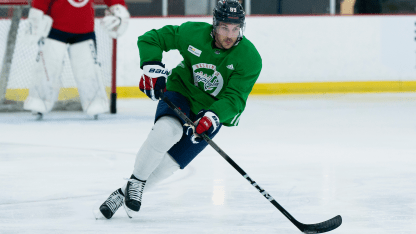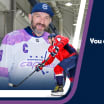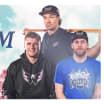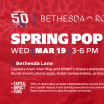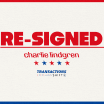Everyone knows that 38-year-old Caps’ captain Alex Ovechkin is the oldest player on the Washington training camp roster this fall, followed by 36-year-old T.J. Oshie and 35-year-old Nicklas Backstrom. But the fourth oldest member of Washington’s camp roster – and one of only four of the 64 players who was born in the 1980s – is local product Garrett Roe, of Vienna, Va.
Monday was an off day for the Capitals, but there are no off days for the Washington coaching staff or hockey operations department. While the players were at home resting and recovering from the arduous first weekend of camp and the team’s first exhibition game, the Caps announced their first series of roster cuts on Monday afternoon.
The 35-year-old Roe was one of eight players cut from the Caps’ roster on Monday. After spending the last decade playing in four different European pro leagues, Roe opted to return to North America to continue his career this fall, signing a one-year contract with AHL Hershey.
While Monday’s news wasn’t pleasant for Roe, it wasn’t unexpected, either. None of the eight players who were cut were on NHL contracts; all fully expected to be at Hershey’s camp when it gets underway on Monday.
After playing professionally for more than a decade on both sides of the Atlantic, Roe knows there are no promises in hockey. His return to the United States to continue his playing career was not a happy event, a grand homecoming designed to finish his career close to where it all started. He’s here for healing more than for hockey.
“For me it was very emotional,” says Roe. “My mom [Julie] was diagnosed, and she passed this summer, so I wanted to be close to home. I wanted to be close to home, close to family, close to my dad [Larry]. He loves hockey more than anything; that’s his number one passion in life. He still works with youth hockey, it’s like his living passion. I wanted to be close to family and I wanted us to heal together. And I also wanted to play for this organization that I grew up a fan of and following.
“So it’s full circle, and Hershey’s got a good team. They’re going to obviously strive to be champions again, and that’s something that’s really appealing. No matter where you’re playing, you want to win. And so to get the family, the healing and the chance to win on a great team, and with the organization that I grew up on, it just seemed like a perfect fit for this part of my career.”
If Roe is on the Hershey roster this season, it will be the closest he has played to home in over 20 years.
Way back in 2004 – the year the Caps drafted Ovechkin – Roe was a 16-year-old invitee to Washington’s summer development camp. He also participated in the team’s rookie camp in Hershey the following summer. Because these were the days before Ovechkin, local youth hockey didn’t have the footprint it has here now. As probably the best youth hockey player in the area at the time, Roe had to leave Northern Virginia at a young age in order to play against a higher level of competition in pursuit of his pro dreams. Roe played for the Reston Raiders – the local youth hockey club his dad helped found – and for the Little Caps. But he needed a bigger challenge by the time high school rolled around.
Beginning in ninth grade, Roe attended the fabled Shattuck St. Mary’s Hockey Center of Excellence in Faribault, Minn., a highly regarded program that has produced more than 100 players who were chosen in an NHL Draft, including Roe, the seventh-round choice (183rd overall) of the Los Angeles Kings in the 2008 NHL Draft.
Roe’s two seasons at Shattuck St. Mary’s set him up to be drafted. In his first season there (2002-03), he finished third on the U14 AAA team with 146 points (73 goals, 73 assists) in 75 games; Kyle Okposo of the Buffalo Sabres was one of the two players with more points than Roe on that squad.
Moving to the U16 AAA team in 2003-04, Roe again finished third on the team in scoring, this time with 105 points (41 goals, 64 assists) in 51 games.
“It was huge because I was the best player here [in the DMV area], and there wasn't really any finding out what's out there unless I went and found out what was out there,” he recalls. “You start to go to select festivals and national tournaments, and you see one team every year: Shattuck. So I went up there and that gave me [a measure of] where I'm at; this is what I need to do, this is who I am in front of, this who I'm behind. It gives you a great baseline of where you are, and then you just challenge yourself every day in practice.
“And then you're around guys who grew up in the game, with parents who played and brothers who played. The Parises took me in, and they were really close with me. I was close to Donna and [longtime NHLer] J.P., and then they had Zach and Jordy playing, It’s just how hockey is up there, and you become part of the culture and then you try to share that whenever you come back. That's just how it's kind of flowered out.”
From Shattuck, Roe moved on to U.S. Junior Hockey, spending the next three seasons with the Indiana Ice of the USHL, where a 16-year-old John Carlson played a couple of games as Roe’s teammate in 2006-07.
In 2007-08, Roe began a prolific collegiate career at St. Cloud St., where his teammates included current Capitals Nick Jensen and Nic Dowd.
“He was hyper-successful at every level,” says Dowd of Roe. “I remember at the junior level he was really successful, and when I came into college as a freshman, he was the mega-stud on St. Cloud that we all knew about.”
Roe graduated with a degree in finance from St. Cloud St., and he finished first or second on the team in scoring all four seasons, putting up more than a point per game in the process. Following his freshman season, Roe earned the distinction of being the first player born and raised in the state of Virginia to be drafted by an NHL club.
Los Angeles didn’t sign Roe, and when he finished at St. Cloud St., he signed with Philadelphia and turned pro with AHL Adirondack in 2010-11. He had two good seasons with Adirondack, putting up middle six-level scoring totals. But in that second season, a lingering NHL lockout thickened AHL rosters via the trickle-down effect; established NHL players still on entry level deals were sent to the AHL to stay sharp during the lockout, and Roe found himself dropped down the Adirondack depth chart, through no fault of his own.
At this early juncture of his career, Roe made the fateful decision to play for Salzburg EC in Austria, leaving the States at the age of 25.
“That’s the only regret I have in my career is going; I thought I left too early,” he says. “I thought I could have played some games up in the National League, but it’s just pecking order. Different organizations operate differently, and now I know that. Some organizations give young guys chances, and their best players are playing. Some organizations want to play the draft picks, and that’s what they want.
“That was the lockout year, and with Philly, we had [Brayden] Schenn and [Sean] Couturier come down,” Roe recalls. “So I went from first-line center to not even in the [picture]. And our coach wanted a third-line checking center, so it was just a tough pill to swallow, and it maybe left me with a bad taste in my mouth for pro hockey over here. If I could do it over again, that summer I had offers from other teams here [in North America]. But I wanted to play hockey and I was just sick of the politics. But if I could do it again, I would have definitely stayed and fought for it.
“And now I tell [other local] guys like Sam Anas and [Joe Snively] – not that they’re in the same spot, but they’re right on the cusp – and I tell them you can go over and you can play. I loved my time in Europe. I have nothing bad to say about it. But it’s just that dream. Once you go over, it’s kind of the end of your shot over here. So, stay over here, put your nose down, and go to work.”
Former college teammate Dowd believes Roe is being a little too hard on himself for his decision to continue his career overseas.
“With Garrett, I think it’s easy to play ‘what if’ game,” says Dowd. “I think he has persevered through a lot of different things, probably some knowing how hard he had to work and some just being a hard worker himself, and believing in himself, and being maybe just a little naïve as to how hard it is actually going to be.
“He’s made a hell of a career for himself and for his family, which is most important at this point in his career. It’s always nice to see guys who have to take the long way, to be successful. I can appreciate that quite a bit. I’m always really, really impressed with guys who continue to get it done, year after year after year, regardless of what’s stacked against them. It’s nice to see, honestly.”
Roe played a season in Austria, a season in Germany, then two seasons in Sweden before moving on to Switzerland, where he played for each of the last six seasons. He also represented his country in the Olympic Games, proudly playing for Team USA in the 2018 Pyeongchang Games in South Korea.
In six of his 10 European seasons, Roe was one of the top two scorers on his team. He may regret going overseas so early in his career, but he carved out a remarkable pro career for himself there, and he and wife Brittany started a family while they were in Switzerland.
“My wife and I have two kids that were born in Switzerland,” he says. “We loved our time in Europe and we would live there full-time if it came to that. Switzerland was unbelievable for us. We lived just outside of Zurich. The town is beautiful, the travel to different countries is easy, the hockey is – Switzerland is a country that’s really full of high-end talent, but a little less structure. It’s starting to come more and more, and you’re seeing it with the guys that they’re developing. It’s a country that’s just taking off, and once they click, I think it’s going to be a pretty powerful country.
“And then you go to a country like Sweden, where the players are just so smart and well-coached and well-educated. And they’re workhorses and you get an honest player. For me, the best time was in Switzerland. I was there the longest and our kids were born there. We have an emotional attachment. Once I went over there, that’s where I was looking to play, was that country and to play in Zurich – to be on a top team in a top city. And so we had the whole European experience, and we absolutely loved it. Absolutely loved it.”
Roe has been an asset on every team he’s ever played for, and that will be the case this season in Hershey too, if he lands a berth on the squad.
“We’re going to take this year and see how it goes,” says Roe. “In speaking with [Caps’ associate general manager] Chris Patrick, he was like, ‘Let’s see how the year pans out for you,” so there’s no guarantee or anything.
“We’ll see how it goes. Maybe I have a great year and I stay in Hershey. Maybe I have a great year and I go back to Europe. Or maybe I have a bad year, and you’re 36 and no one wants to sign you. And that’s how the job is. It’s a performance-based job and you can put up points, be a good teammate, help with the young guys and the veterans; and I plan to dip my feet into each of those, and to just try to be an asset to the team.”
Regardless of how this season goes, Roe realizes he is closer to the end than the beginning of his career. His love for the game of hockey has never diminished, and the presence of new head coach Spencer Carbery and first-year NHL assistant coach Mitch Love has to give Roe some pause. Neither Carbery nor Love ever reached the NHL as players either, but both have flourished as coaches, working their way to the world’s top hockey league in that fashion.
“I would love to; I would love to,” Roe reasserts, when asked about the possibility of going into coaching. “That’s something we’ve definitely thought about. I feel like I have a really good head for the game, and just managing different guys and personalities. That’s the biggest part of it. I think most of the time, the biggest hurdles are just balancing the guys and managing the ups and downs of the day.
“But it’s something I’m definitely interested in. I’d love to do it. We’ll see where we are in a couple of months, 10 months from now. It’s next step, one foot in front of the other. And as long as you’ve got your family and a good life, nothing can be really that bad.”

